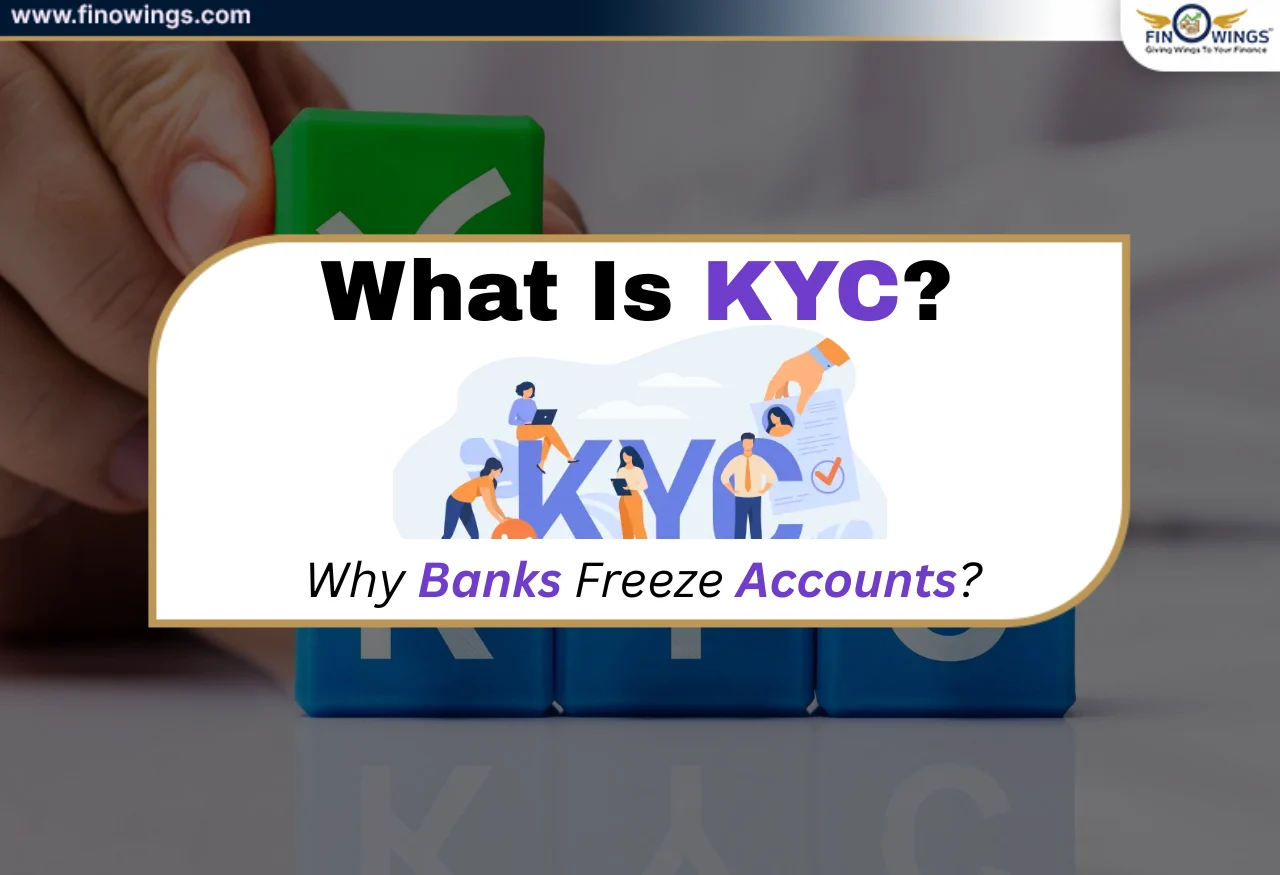Home >> Blog >> What Is KYC & Why Banks Freeze Accounts? Explained
What Is KYC & Why Banks Freeze Accounts? Explained

Table of Contents
- 1. What Is KYC? (KYC Meaning Explained)
- What is the purpose of KYC?
- 2. Why is KYC Mandatory for all Indians?
- 3. Why Do Banks Freeze Accounts? (Top Verified Reasons)
- 4. Different Kinds of KYC as in 2025
- 5. Document Required for KYC Verification
- 6. Updating KYC If Your Bank Account is Frozen
- 7. What If KYC is Ignored?
- 8. How to Avoid Account Freeze in the Future?
- 9. Myths regarding Know Your Customer (KYC)
- 10. Importance of KYC
- 11. KYC in India (2025-2030)
- Conclusion
Because of a lack of understanding surrounding the acronym KYC, the mandatory digital KYC, the various reasons banks block accounts, and why KYC is mandatory, thousands of account holders continue to suffer everyday inconveniences.
Completing the KYC process requires certain documents, mandatory for all banks to comply with, and there is a way to stop having your account frozen. This blog provides a complete explanation of the banks' enforcement of these rules and the exact reasons your account is blocked.
For digital KYC, re-KYC, PAN-Aadhaar linking requirements, and compliance rules, this is a expert guide for 2025.
1. What Is KYC? (KYC Meaning Explained)
KYC full form = Know Your Customer.
To banks and other financial institutions, KYC means:
- Who you are? (Identity verification)
- Where you live? (Address verification)
- Is your account being used legally?
Put simply,
"I am KYC, I'm proving my identity, and my address to the bank using valid documents." This process reduces fraud, protects customers, and most importantly keeps the financial system safe.
What is the purpose of KYC?
To protect the bank and users from the following illegal activities that are against the law, banks have to abide by the regulations of the RBI with regards to KYC:
- Money laundering.
- Terror funding.
- Opening counterfeit accounts.
- Transferring black money.
- Committing fraudulent activities in banking.
- Identity theft.
- Tax evasion.
Because of the rapid growth of digital transactions, especially with UPI, the RBI has imposed KYC regulations from the year 2025 to protect millions of customers.
2. Why is KYC Mandatory for all Indians?
When many people hear that KYC has to be done, they automatically think that KYC only has to be done by new customers.
Unfortunately, that is not the case, as the RBI KYC Regulations 2025 clearly state that every single human being has to complete KYC and then have that approved by the responsible official and then every other year after that has to be updated and approved.
For the following reasons, you are required to complete KYC:
- Opening a bank account.
- Accessibility to UPI apps such as GPay, PhonePe, and Paytm.
- Credit cards.
- Fixed deposits.
- Mutual funds and systematic investment plans (SIPs).
- Stock trading and demat accounts.
- Loans and insurance purposes.
- Wallets such as Amazon Pay and Mobikwik.
Banks have no choice and are legally mandated to freeze your accounts or limit activities on your account if you do not provide KYC.
Astrology-2023 Year of the Rabbit (Last Updated September 2023)
3. Why Do Banks Freeze Accounts? (Top Verified Reasons)
Most customers do not understand why banks freeze their accounts.
In 2024 and 2025, the RBI strengthened the know your customer (KYC) policies. As a result, millions of customers lost access to their accounts. The most common examples of KYC issues that cause banks to freeze accounts include:
Reason 1: KYC Not Updated or KYC Expired
Banks place customers within different risk categories:
Low risk: KYC re-submission every 10 years.
Middle risk: KYC re-submission every 8 years.
Top risk: KYC re-submission every 2 years.
If you fail to attend the scheduled re-KYC period, your bank will have to freeze your account.
Reason 2: Suspicious or High-Risk Transactions
If a bank identifies activity that doesn’t correlate with your account history, your account might get frozen.
Some examples are:
- Sudden large deposits
- Constant UPI transfers to unknown accounts
- Recent history of large cash withdrawals
- Unplanned foreign remittances
- Payments related to cryptocurrency
This is to help mitigate risks related to security and fraud.
Reason 3: Disparity of Information in the Bank KYC Records
If your provided name or date of birth or your proof of ID or your signature do not match the bank records, your KYC is considered a fail. Your KYC will be frozen until you rectify the situation.
Most common mismatches:
-
Names mismatch PAN vs Aadhaar.
-
Old address vs new address.
-
Changed mobile number.
-
Signature mismatch.
Reason 4: PAN-Aadhaar Not Linked
Since PAN-Aadhaar linking is mandatory, many banking features stop functioning if the link is missing.
This affects:
-
High-support transactions.
-
Demat account.
-
Mutual funds.
-
Credit card KYC.
Reason 5: Incomplete KYC Documents Submitted
Many customers upload:
-
Blurred Aadhaar.
-
Expired Passport.
-
Old address proof.
-
Wrong PAN.
-
Incorrect photograph.
Banks instantly reject such KYC verification, leading to an account freeze.
Reason 6: Enhanced Due Diligence (EDD)
If you fall under a high-risk category -
-
High-value business account
-
Politically exposed person (PEP)
-
Frequent foreign transfers
-
Crypto-related income
-
Your account undergoes enhanced KYC scrutiny.
-
Until documents are verified, the account may be temporarily frozen.
Reason 7: Legal or Compliance Notice
Banks must freeze accounts if instructed by:
-
Income Tax Department
-
GST Department
-
Enforcement Directorate
-
Court Orders
-
Police orders
-
This is beyond the bank’s control.
If your mobile or UPI is reported hacked or you report unauthorised transactions, the bank freezes your account to protect your money
4. Different Kinds of KYC as in 2025
Knowing the types of KYC can help avoid confusion.
a. Digital KYC (Paperless KYC)
The most prevalent one in 2025.
Can be completed using :
1. Aadhar OTP
2. PAN verification
3. Live selfie
4. Video KYC
5. Document upload
b. e-KYC (Aadhar OTP Based)
Fastest of all, just enter Invoice number -> OTP -> Verified.
c. CKYC (Central KYC)
Once CKYC is done, no separate KYC is needed for:
1. Mutual funds
2. Demat account
3. Insurance
4. Loans
c. In-Person / Physical KYC
Completed at the branch with the documents.
5. Document Required for KYC Verification
Before we proceed with the KYC process, get the following ready:
Identity Proof
1. Aadhar
2. PAN
3. Passport
4. Voter ID
Address Proof
1. Aadhar
2. Passport
3. Electricity bill
4. Rent agreement
Additional (If Required)
1. Income proof
2. GST certificate
3. Photo
6. Updating KYC If Your Bank Account is Frozen
Complete the following steps in order to quickly unfreeze your account.
Step 1: Update KYC Online
(Available for most major banks)
1. Log in to internet/mobile banking.
2. Go to KYC Update.
3. Upload Aadhar & PAN.
4. Live selfie/video verification.
5. Submit.
The account usually unfreezes in the next 24 to 48 hours.
Step 2: Go to a Bank Branch (In-Person KYC)
Mandatory if:
- POA discrepancy
- Signature discrepancy
- Document rejection
-Steps: Carry ID + Address Proof to Bank Branch
-
Complete the KYC form
-
Perform signature update
-
Completed verification on the spot
Step 3: KYC via Email
Only if requested by the bank, some places permit the scanned documents to be sent via email.
Step 4: Video KYC
With the intention to:
- Confirm identity
- Perform liveness detection
- Match documents
Banks will set up a brief video call.
7. What If KYC is Ignored?
If KYC is ignored, the banks take the following actions:
- 1. Limitations on Transactions - You won't be able to move large sums of money.
- 2. Blocked Debit Card, UPI, ATM
- 3. No Access to Internet Banking
- 4. Your Account is Completely Frozen
- 5. Your Account is Permanently Closed after a Long Delay
- It's why KYC is so necessary.
8. How to Avoid Account Freeze in the Future?
Be fully proactive by following these simple steps:
- Keep Aadhaar and PAN linked
- Bank number update
- Reply to bank messages
- Avoid suspicious transactions
- Keep address proof up to date
- Complete KYC when due
- Valid Share documents and in focus
- Don't use unverified bank websites
Following these steps guarantees easy banking.
9. Myths regarding Know Your Customer (KYC)
Myth: “KYC is optional.”
Fact: KYC is compulsory by rule from the RBI.
Myth: “Bank freezes accounts anytime and won’t give any prior notice.”
Fact: The bank has to issue multiple notices until it freezes your account.
Myth: “KYC should only be done once.”
Fact: KYC has to be done again and again (Re-KYC).
Myth: “Digital KYC processes are unprotected and unsafe.”
KYC documents are protected and encrypted and they are digitized and signed off by the RBI.
10. Importance of KYC
KYC is essential in avoiding the following:
-
Financing of Terrorism
-
Hawala transaction
-
Cross-border illegal facilities
-
Fake accounts
-
Tax fraud
-
Cyber crimes
KYC prevents seamless operations by criminals in the banking ecosystem.
11. KYC in India (2025-2030)
There will be massive developments in the next 10 years.
● KYC with face recognition.
● Document verification with A.I
● Secure KYC on the blockchain.
● Complete digital onboarding
● Automated Anti-Money Laundering (AML) scoring.
● PAN-Aadhaar merged identity system
India is heading towards a digitized ecosystem with a singular digital identity system.
Conclusion
To understand, KYC is important to prevent disruptions to your account, restricted transactions, or even your banking services being halted. Completing KYC is not simply a mandatory banking procedure, but an identity verification process that is vital to keeping the banking system secure, stable and operating transparently.
Completing KYC on time is essential it is simply a procedure to complete rather than a potential risk of your account, if not already completed, being blocked or frozen, transactions being restricted and your banking services being interrupted. A bank may freeze or block accounts simply because KYC is absent or is due, because there are mismatched details and/or suspicious activity, and/or because of the KYC rules 2025 that the bank follows which are governed by KYC guidelines issued by the Reserve Bank of India in 2025.
DISCLAIMER: This blog is NOT any buy or sell recommendation. No investment or trading advice is given. The content is purely for educational and information purposes only. Always consult your eligible financial advisor for investment-related decisions.
Author
Frequently Asked Questions
- All the steps required to confirm that their clients are honest, evaluate, and manage risk are included in the KYC protocols that banks define.
- These client-onboarding methods aid in the detection and prevention of criminal fraud, terrorist activity, and money laundering.
- Identification document certification, face identification, document authentication using electricity bills as evidence of address, and biometric confirmation are all part of the KYC procedure.
- To reduce crime, banks should abide by KYC and anti-money laundering requirements. The banks are responsible for KYC adherence.
- If you don't comply, you could face severe fines.
- AML, KYC, and sanctions fines have resulted in cumulative fines of USD26 billion in the past ten years (2008-2018) across the United States, Europe, the Middle East, and Asia-Pacific, not to mention the reputational harm that has been done but is not quantified.
Bankers and consultants must use KYC in the financial industry to verify their clients, firms' beneficial owners, and client connections' nature and goals. In addition, banks are required to monitor and guarantee the correctness of client accounts as well as review client accounts for questionable and unlawful behaviour.
The term "Electronic Know Your Customer" (eKYC) refers to a procedure used in India wherever the user's identification and address are digitally confirmed using Aadhaar verification. India's nationwide biometric eID program is called Aadhaar.
eKYC includes data extraction from government-issued intelligent identification (with a chip) with a physical appearance, data collected from IDs using OCR mode, verified virtual labels, and facial recognition for online proof of identity.




















